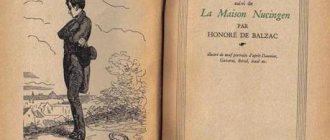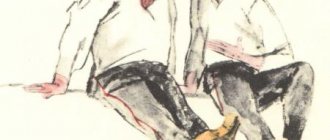- Essays
- On literature
- Leskov
- Heroes of the story Man on the Clock
N.S. Leskov, one of the famous writers who used Russian speech in their work. The writer expressed in his works the point of view of the Russian people. With a variety of images drawn from the common Russian people, he demonstrates the Russian person as a very smart, strong and courageous character.
This is exactly what the main character of his story “The Man on the Clock,” the ordinary soldier Postnikov, seemed like. He had a difficult choice to save a man’s life and leave his post. Or be punished for failure to comply with the decree. The case based on real events was described by Leskov in this story “The Man on the Clock”
By this, the author shows that even in such a difficult situation with a difficult choice, the soldier remains a kind person who can always help.
When he saved a drowning man, instead of being rewarded for the good he had done, they decided to punish him, since a passing officer took upon himself the deed. He was flogged with rods, but the man who took it upon himself to save a drowning man received a medal. When the truth came out, Postnikov was very glad that he was not whipped to death. Svinin, who also contributed to the punishment, having learned the truth, gave Postnikov a pound of sugar and a quarter of a pound of tea. For which the soldier, of course, was very grateful to him.
The image of Pork is described by the author as interesting. Svinin was a very calculating person, he was interested in his career and the opinion of his superiors about him. He does not admit that his order to punish Postnikov was very absurd. He hides behind empty words, trying to divert from the point that he put the soldier in a punishment cell for no reason and ordered him to be flogged with sticks. Postnikov was subordinate to Svinin. Lieutenant Colonel Svinin appears to the reader as a two-faced hero. On the one hand, he seems to punish Postnikov, and on the other, he encourages his heroic act.
Captain Miller, subordinate to Lieutenant Colonel Svinin, was very smart. One of his subordinates, despite all the respect for Postnikov’s action, is forced to obey the orders of his elder, and punishes the soldier. Nikolai Ivanovich Miller is a real character; he was an acquaintance of Leskov, who once told this story described in the work “The Man on the Clock.”
The officer is the only witness to Postnikov's act, who takes upon himself the heroic act. Thus, in the work he is a false hero. Hoping to get a reward for saving a drowning man, he takes credit for saving the man. But, despite his bland stories, the police didn’t really believe him. Wanting to evade the tsar's displeasure, for the misconduct of Postnikov (who left his post located near the tsar's palace), Lieutenant Colonel Svinin decides to reward the Officer who served in the palace.
Nikolai Vasilyevich Leskov in his works shows what a strong and strong character the Russian people have. He wrote not only about ordinary people, but also about the destinies of talented and very unusual people who emerged from the common Russian people.
"Man on the Clock" (main characters)
The story was published in 1887 in the magazine “Russian Thought”. Leskov heard it from N.I. Miller, who was at that time the director of the Alexander (Tsarskoye Selo) Lyceum. When the events of the work took place, Miller was still a company commander of the Izmailovsky regiment.
The main characters of the story “The Man on the Clock”:
Nikolai Ivanovich Miller is an officer with an excellent education, one of those who were called humanitarians.
Soldier Postnikov is a soft-hearted person; he could not hear pleas for help and not provide that very help. He understood that he had no right to violate the order and leave his post under any circumstances. Hearing how a person died was also beyond his strength. He chose to leave his post to help the drowning man.
The officer of the disabled team is a liar and an ambitious man, who set out to receive a medal for saving a drowning man, and announced that he saved the drowned man, and even at the risk of his own life.
Lieutenant Colonel Svinin is a demanding and unforgiving officer to the point of cruelty. For him in the service, discipline came first, and then everything else. He protected his well-started career. Svinin realized that Postnikov had violated the military regulations. And if this reaches the Sovereign, no one’s head will be cut off: neither the officers, nor the soldier, and he was already thinking about who to go to in order to hush up the matter. He still ordered the soldier Postnikov to be flogged.
The drowning man was a little drunk and wanted to take a shortcut, but he fell into a hole in the water and began to drown. He didn't care who saved him. Yes, from fear and darkness, he didn’t really see who helped him get out of the hole. He pointed to the disabled team officer.
Kokoshkin is the chief police officer of St. Petersburg. They said about him that he not only makes a mountain out of a molehill, but also a fly out of an elephant. He could have hushed up this matter so that it would not reach the Emperor. Contrary to Svinin’s expectations, Kokoshkin knew nothing about the drowned man and the misconduct of the guard soldier. The chief police chief carried out his own investigation and realized that everything had sorted itself out. He advised Svinin to forget this story.
In this story, Leskov admires the soldier Postnikov.
“I think about those mortals who love goodness simply for its own sake and do not expect any rewards for it, anywhere. These straightforward and reliable people, too, it seems to me, should be completely satisfied with the holy impulse of love and the no less holy patience of the humble hero of my precise and artless story.”
- this is what the author says about Postnikov, and with these words his story ends.
Source
Guardhouse
No one, neither an officer nor a soldier, can defend him, since in such cases one cannot make excuses or object, so as not to run into big trouble. Miller immediately reports to the battalion commander Svinin about what happened and asks for help in this delicate matter. And he immediately arrives at the guardhouse of the Winter Palace. After some proceedings, Miller is also caught and Postnikov is arrested. In the morning, Chief Police Chief Kokoshkin prepares a report to the sovereign on all matters.
Svinin was very worried and therefore immediately went to Kokoshkin, who immediately gathered everyone who was involved in this case. Having interrogated everyone, he makes his verdict, since the drowning man was drunk, did not remember his savior well and in confusion pointed to the officer who brought him to the station, the first will be released, and the second will be presented for a reward.
Heroes of the story The Man on Leskov's Clock (brief description)
N.S. Leskov, one of the famous writers who used Russian speech in their work. The writer expressed in his works the point of view of the Russian people. With a variety of images drawn from the common Russian people, he demonstrates the Russian person as a very smart, strong and courageous character.
This is exactly what the main character of his story “The Man on the Clock,” the ordinary soldier Postnikov, seemed like. He had a difficult choice to save a man’s life and leave his post. Or be punished for failure to comply with the decree. The case based on real events was described by Leskov in this story “The Man on the Clock”
By this, the author shows that even in such a difficult situation with a difficult choice, the soldier remains a kind person who can always help.
When he saved a drowning man, instead of being rewarded for the good he had done, they decided to punish him, since a passing officer took upon himself the deed. He was flogged with rods, but the man who took it upon himself to save a drowning man received a medal. When the truth came out, Postnikov was very glad that he was not whipped to death. Svinin, who also contributed to the punishment, having learned the truth, gave Postnikov a pound of sugar and a quarter of a pound of tea. For which the soldier, of course, was very grateful to him.
The image of Pork is described by the author as interesting. Svinin was a very calculating person, he was interested in his career and the opinion of his superiors about him. He does not admit that his order to punish Postnikov was very absurd. He hides behind empty words, trying to divert from the point that he put the soldier in a punishment cell for no reason and ordered him to be flogged with sticks. Postnikov was subordinate to Svinin. Lieutenant Colonel Svinin appears to the reader as a two-faced hero. On the one hand, he seems to punish Postnikov, and on the other, he encourages his heroic act.
Captain Miller, subordinate to Lieutenant Colonel Svinin, was very smart. One of his subordinates, despite all the respect for Postnikov’s action, is forced to obey the orders of his elder, and punishes the soldier. Nikolai Ivanovich Miller is a real character; he was an acquaintance of Leskov, who once told this story described in the work “The Man on the Clock.”
Nikolai Vasilyevich Leskov in his works shows what a strong and strong character the Russian people have. He wrote not only about ordinary people, but also about the destinies of talented and very unusual people who emerged from the common Russian people.
Officer
At the same time, an officer was passing by on a sleigh; he drove up to them and began asking about what had happened, but Postnikov had a gun and was again standing in the booth. Then the officer loaded the wet man into a sleigh, took him to the bailiff and made a statement that he had saved the man. The one who was rescued, exhausted and wet, did not remember anything, and he did not care who saved him. The bailiffs looked with suspicion at the officer, whose clothes were dry and who wanted to receive the award “For saving the dead.” This is how the summary continues its development. “The Man on the Watch” goes on to say that there was a hubbub in the palace guardhouse, because Postnikov, although he saved the man, violated the Charter.
"Man on the Clock" (main characters)
The story was published in 1887 in the magazine “Russian Thought”.
Leskov heard it from N.I. Miller, who was at that time the director of the Alexander (Tsarskoye Selo) Lyceum. When the events of the work took place, Miller was still a company commander of the Izmailovsky regiment. The main characters of the story “The Man on the Clock”:
Nikolai Ivanovich Miller is an officer with an excellent education, one of those who were called humanitarians.
Soldier Postnikov is a soft-hearted person; he could not hear pleas for help and not provide that very help. He understood that he had no right to violate the order and leave his post under any circumstances. Hearing how a person died was also beyond his strength. He chose to leave his post to help the drowning man.
The officer of the disabled team is a liar and an ambitious man, who set out to receive a medal for saving a drowning man, and announced that he saved the drowned man, and even at the risk of his own life.
Lieutenant Colonel Svinin is a demanding and unforgiving officer to the point of cruelty. For him in the service, discipline came first, and then everything else. He protected his well-started career. Svinin realized that Postnikov had violated the military regulations. And if this reaches the Sovereign, no one’s head will be cut off: neither the officers, nor the soldier, and he was already thinking about who to go to in order to hush up the matter. He still ordered the soldier Postnikov to be flogged.
The drowning man was a little drunk and wanted to take a shortcut, but he fell into a hole in the water and began to drown. He didn't care who saved him. Yes, from fear and darkness, he didn’t really see who helped him get out of the hole. He pointed to the disabled team officer.
Kokoshkin is the chief police officer of St. Petersburg. They said about him that he not only makes a mountain out of a molehill, but also a fly out of an elephant. He could have hushed up this matter so that it would not reach the Emperor. Contrary to Svinin’s expectations, Kokoshkin knew nothing about the drowned man and the misconduct of the guard soldier. The chief police chief carried out his own investigation and realized that everything had sorted itself out. He advised Svinin to forget this story.
In this story, Leskov admires the soldier Postnikov.
“I think about those mortals who love goodness simply for its own sake and do not expect any rewards for it, anywhere. These straightforward and reliable people, too, it seems to me, should be completely satisfied with the holy impulse of love and the no less holy patience of the humble hero of my precise and artless story.”
This is what the author says about Postnikov, and with these words his story ends.
Source
Leskov Nikolay Semenovich
Man on the clock
Nikolay Leskov
Man on the clock
1
The event, the story of which is brought to the attention of readers below, is touching and terrible in its significance for the main heroic person of the play, and the denouement of the case is so original that something similar to it is hardly even possible anywhere except Russia.
This is partly a courtly, partly a historical anecdote, not bad characterizing the morals and direction of a very interesting, but extremely poorly noted era of the thirties of the ongoing nineteenth century.
There is no fiction in the upcoming story at all.
2
In winter, around Epiphany, in 1839, there was a strong thaw in St. Petersburg. It was so wet that it was almost like it was spring: the snow was melting, drops were falling from the roofs during the day, and the ice on the rivers turned blue and turned watery. There were deep ice holes on the Neva in front of the Winter Palace. The wind was blowing warm, from the west, but very strong: water was blowing in from the seaside, and the cannons were firing.
The guard in the palace was occupied by a company of the Izmailovsky regiment, which was commanded by a brilliantly educated and very well-established young officer, Nikolai Ivanovich Miller (*1) (later a full general and director of the lyceum). This was a man with a so-called “humane” tendency, which had long been noticed in him and slightly harmed his service in the attention of the highest authorities.
“In fact, Miller was a serviceable and reliable officer, and the palace guard at that time did not pose anything dangerous. It was the quietest and most serene time. The palace guard was not required to do anything other than accurately stand at their posts, and yet right here, on Captain Miller’s guard line at the palace, a very extraordinary and alarming incident occurred, which few of the living contemporaries of that time now barely remember.
3
At first everything went well on guard: posts were distributed, people were placed, and everything was in perfect order. Emperor Nikolai Pavlovich was healthy, went for a ride in the evening, returned home and went to bed. The palace also fell asleep. The calmest night has arrived. There is silence in the guardhouse (*2). Captain Miller pinned his white handkerchief to the high and always traditionally greasy morocco back of the officer's chair and sat down to while away the time with a book.
N.I. Miller was always a passionate reader, and therefore he was not bored, but read and did not notice how the night floated away; but suddenly, at the end of the second hour of the night, he was alarmed by a terrible anxiety: a non-commissioned non-commissioned officer appeared in front of him and, all pale, overwhelmed with fear, babbled quickly:
- Trouble, your honor, trouble!
- What's happened?!
- A terrible misfortune has befallen!
N.I. Miller jumped up in indescribable alarm and could hardly really find out what exactly the “trouble” and “terrible misfortune” were.
4
The matter was as follows: a sentry, a soldier of the Izmailovsky regiment, by the name of Postnikov, standing on guard outside at the present Jordan entrance, heard that in the hole that covered the Neva opposite this place, a man was drowning and desperately praying for help.
Soldier Postnikov, one of the gentlemen's courtyard people, was a very nervous and very sensitive person. For a long time he listened to the distant screams and moans of the drowning man and became numb from them. In horror, he looked back and forth at the entire expanse of the embankment visible to him and, as luck would have it, neither here nor on the Neva, he did not see a single living soul.
No one can give help to a drowning person, and he will certainly drown...
Meanwhile, the drowning man struggles terribly long and stubbornly.
It seems like he could only do one thing - to go down to the bottom without wasting energy, but no! His exhausted moans and inviting cries either break off and fall silent, then begin to be heard again, and, moreover, closer and closer to the palace embankment. It is clear that the man is not yet lost and is on the right path, straight into the light of the lanterns, but he, of course, still will not be saved, because it is here, on this path, that he will fall into the Jordanian ice hole. There he dives under the ice, and that’s it... Then it goes quiet again, and a minute later he’s gargling again and moaning: “Save me, save me!” And now it’s so close that you can even hear splashes of water as he rinses...
Soldier Postnikov began to realize that it was extremely easy to save this man. If you now escape onto the ice, then the drowning person will certainly be right there. Throw him a rope, or give him a six, or give him a gun, and he is saved. He is so close that he can grab his hand and jump out. But Postnikov remembers both the service and the oath; he knows that he is a sentry, and the sentry never dares to leave his booth under any pretext.
On the other hand, Postnikov’s heart is very rebellious: it aches, it pounds, it stops... Even if you tear it out and throw it at your own feet, these groans and cries make him so restless... It’s scary to hear how another person dies, and there is no way to give help to this dying person, when, in fact, there is every opportunity for this, because the booth will not run away from its place and nothing else harmful will happen. “Or run away, huh?.. They won’t see?.. Oh, Lord, it would only be the end! Moaning again..."
In the one half hour that this lasted, soldier Postnikov became completely tormented in his heart and began to feel “doubts of reason.” But he was a smart and serviceable soldier, with a clear mind, and understood perfectly well that leaving his post was such a crime on the part of the sentry, which would immediately be followed by a military trial, and then a race through the ranks with gauntlets and hard labor, and maybe even and “execution”; but from the side of the swollen river, moans are again flowing closer and closer, and gurgling and desperate floundering can already be heard.
- W-o-o-well!.. Save me, I’m drowning!
Here now there is a Jordanian ice hole... The end!
Postnikov looked around in all directions once or twice. There’s not a soul anywhere, only the lanterns shake and flicker in the wind, and this scream flies intermittently down the wind... maybe the last scream...
Another splash, another monotonous scream, and the water began to gurgle.
The main characters and their characteristics
- a soldier of the Izmailovsky regiment - an honest, conscientious, sympathetic person. He clearly understood what he was facing for leaving his post. But the good Russian soul cannot allow another to die. Duty to the oath and compassion fought in him for a long time, which ultimately won.
Officer of the Court Disabled Team
- a person who is capable of openly lying for his own benefit. However, by the will of fate, he became the unwitting savior of several people.
- a lieutenant colonel who does not accept humanism in the army. He believes that the charter is an immutable law. He sacredly honors his unblemished career.
Summary of the story “The Man on the Clock”
In January 1839 there was a strong thaw in St. Petersburg. Polynyas formed on the ice-covered Neva. Postnikov, a soldier of the Izmailovsky regiment, standing guard at the Winter Palace, suddenly heard cries for help from a man who had fallen through the ice. But according to the regulations of the guard service, the sentry must stand at his post and under no circumstances leave it.
The sensitive soul of the soldier suffered because he was forced to listen to screams, but could not help. And there is no one around to save the drowning man. Understanding full well that by deciding to pull a man out of the icy river, he is exposing himself to a military trial and hard labor, Postnikov succumbs to the dictates of his heart.
Now the man is already on the shore, but where should we put him, wet and exhausted? Suddenly an officer appeared, riding past in a sleigh. He stopped and began asking what happened.
For the sentry who left his post, this could turn out both for the better (the rescued person could be left to him) and for the worse (the officer witnessed an offense). Therefore, the soldier quickly returned to the booth.
And a random eyewitness decided to appropriate the glory of the savior and took the clueless man to the police station. However, they didn’t really believe him and began to ask for detailed details of what happened.
The wet sentry told his captain about the incident. Miller reported to the lieutenant colonel, who ordered Postnikov to be placed under arrest. This offense could have harmed many in the regiment and ruined Svinin’s career. Therefore, without waiting for the morning, he went to Chief of Police Kokoshkin to decide what to do next.
The general summoned the police bailiff, the officer and the reveler pulled out of the water. The false “savior” really wanted to receive a reward, and he continued to brazenly lie that, risking his life, he pulled the man out of the water. Kokoshkin, fortunately for everyone, decided to stick to this version.
The former drowning man was glad that he was finally released. The disabled officer received the desired medal. Svinin avoided the danger of harming his career. He ordered the soldier to be flogged, and then even visited him in the infirmary and gave him a pound of sugar and a quarter of a pound of tea.
Kokoshkin was pleased that the incident would not become known to the sovereign. The culprit was happy that he would not be sent to hard labor for his offense.
Other characters
Kokoshkin
- General, Chief of Police.
Miller
- officer, commander of the Izmailovsky regiment.
Lord –
priest.
“In winter, around Epiphany, in 1839, there was a strong thaw in St. Petersburg,” the ice on the Neva melted. The sentry, soldier of the Izmailovsky regiment Postnikov, standing on guard “at the current Jordanian entrance, heard a man in the field” screaming and begging for help. Postnikov hesitated for a long time because he had no right to leave the guard post.
Unable to bear it, the soldier ran to the river and, using a gun, helped the drowning man get out.
While the soldier was thinking about who to hand over the completely wet and trembling man, the sleigh of an officer of the “court invalid team” just drove out onto the embankment. Postnikov quickly returned to his post. Without finding out the details, the officer took the man with him and took him “to a moving house,” calling himself a savior. The rescued one was too weak, so he didn’t care who helped him.
The palace guard learned that Postnikov had left the guard. He was immediately replaced and sent to Officer Miller. Fearing that the incident would be reported to the sovereign, the commander asked officer Svinin for help. Svinin, having ordered Postnikov to be put in a punishment cell, went to Chief of Police Kokoshkin.
Having learned about what had happened, Kokoshkin ordered the disabled officer and the rescued person to be summoned to him. During the interrogation, it turned out that there were no witnesses to the incident except the sentries. A disabled officer who pretended to be a savior was awarded a medal “for saving the dead.”
For Postnikov, Svinin determined the punishment - “two hundred rods.” After the “execution,” the soldier was taken to the regimental infirmary. Svinin visited Postnikov, bringing him “a pound of sugar and a quarter of a pound of tea.” The soldier was grateful to the officer. “He was really “pleased” because, sitting in a punishment cell for three days, he expected much worse,” and two hundred rods was not such a significant punishment compared to what could have awaited him under the verdict of a military court.
The bishop became interested in rumors about this incident. Having learned the story from Svinin, the priest concluded: “For a warrior to endure humiliation and wounds for his feat can be much more useful than to be exalted by a badge.”
Conclusion and your opinion
The work touches on many important topics: human kindness, mercy, injustice, meanness. The act of General Kokoshkin at first glance may seem unfair and even vile, but it was thanks to his tact and cunning that many innocent people managed to avoid punishment. Postnikov could have been executed for his act. He understood this perfectly well, and was very happy that he got off with corporal punishment. At the same time, he was such a kind and merciful person that he did not consider his act a feat. He saved the man only because his conscience told him so.
Rescue of a drowning man
The work begins with a colorful description of hot weather in winter. Due to the high temperature, the ice cover on the rivers was rapidly melting. One soldier from the Izmailovsky regiment, who was on duty that day, heard terrible human screams. A man's voice called people for help. Postnikov did not know what to do correctly, because he could not leave the guard, and the drowning man continued to scream.
The soldier decided to run and look at the situation, because the voice was coming from the direction of the river. He was able to save the stranger by pulling him out with a gun. But the life of the drowning man was still in danger, as he was very cold and had lost a lot of strength. Next, the military man noticed the officer in the wheelchair and immediately returned to his own post. This man picked up the stranger and, imagining himself a hero, took him to the nearest house.
A couple of tens of minutes of the soldier's absence from the post did not remain a secret . His offense was noticed and sent to Officer Miller, after which the man was put in a punishment cell. The commander was afraid that the emperor would find out about the incident, so he turned to his senior comrade Svinin for help. A very large number of people already knew about the incident, and the officers decided to ask Kokoshkin for help, who immediately took decisive steps.
He wanted to meet with the disabled officer and with the person whose rescue had caused such a commotion among a large number of high-ranking military personnel. The imaginary savior and the drowning man were thoroughly interrogated.
Soldier Postnikov
Sentinel Postnikov, standing on duty, heard that not far from him a man was drowning and calling for help. Postnikov was a “nervous and sensitive” person, so he could not remain indifferent, although he knew that the guard was strictly forbidden to leave his poop booth. During these half an hour, Postnikov’s heart almost broke, but he still decided to save the poor man from the icy water of the Neva.
Further interesting information is given in a brief summary. “The Man on the Clock” tells the story that after rescuing a drowning soldier who left a guarded post, he will face severe punishment, including execution or sent to hard labor, only in the best case, he will be flogged half to death.
Moral problems in the stories of N.S. Leskova presentation for the lesson (grade 6) on the topic
Topic: “Moral problems of the story by N.S. Leskov "Man on the Clock" (1887)"
Goals:
· Analyze with students the main problems of Leskov’s story
· Determine the idea of the work
· Establish a connection between this story and the previously studied tale about the Tula Lefty
· Develop skills in working with the text of a work of art
· Develop students’ skills in determining the author’s position in a work, the role of irony in revealing an idea
· Enrich students’ vocabulary (familiarity with new words “humanism”, “liberalism”)
· Foster a sense of true patriotism using examples of classical literature
· Foster a culture of speech
· Develop the ability to listen to the answers of classmates, giving them the opportunity to express their thoughts.
Main characters
Postnikov is a private in the Izmailovsky regiment, a guard, kind, compassionate, decent, a man of duty.
Miller Nikolai Ivanovich - captain of the Izmailovsky regiment, a young, educated officer, humanist.
Svinin is a lieutenant colonel of the Izmailovsky regiment, a kind and fair man, for whom service was above all else.
Kokoshkin is a general, chief police officer, who managed to correct a difficult situation.
The officer is a palace officer, vile, deceitful, hypocritical, ambitious.
Source








